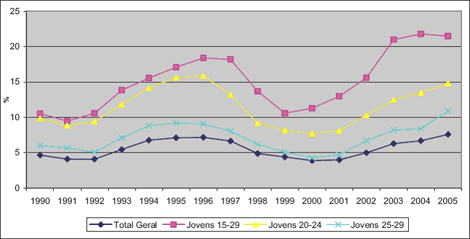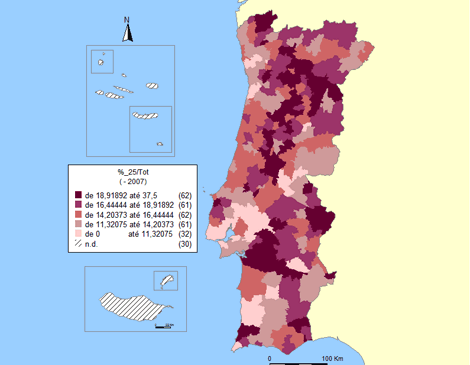
The issues that concern Youth
The great issues that concern youth, particularly that group already identified today as that of adult youth, are very conspicuous in Portugal, although they exist all over Europe.
Autonomy, education and training and employment are some of the topics which most concern youth.
The lack of autonomy until fairly late youth is one of their greatest concerns, in Portugal as well as in many European countries, especially in Southern Europe, which may be specifically due to the lengthening of the educational and training careers and to the vulnerability of the insertion of youths in the labour market.
This adjournment of the entry into adult age, with dependence from the family or from public aid, derives essentially from the degradation of the devices for professional insertion (“mileuristas” – born between 1968 and 1982, with monthly earnings of approximately 1,000 euros –, non-contracted work, insecurity), from the widening of the stages which lead to adult life (end of education, marriage, employment) and from the lengthening of schooling into higher education.

Taxa de desemprego
Fonte: Instituto Nacional de Estatística - Portugal

Chart: Incidence of Youth Unemployment (percentage of unemployed young people
aged less than 25 in total unemployed numbers) - 2007
Youth appears as an intermediate stage between infancy and adult age with ever more undefined contours, when only one generation ago the entry into adult life was clearly defined by the axes school/professional and family/marriage.
There is equally a clear emphasis of individual trajectories, each path with innumerable options, and from this derives a great uncertainty as to which should definitively be taken. Each choice, be it academic, professional or matrimonial is nowadays easily reversed.
The rate of schools attendance of the young population has grown by approximately 8% in the last fifteen years, a growth which reached 16 percentage points in the younger (15-19) age bracket, particularly conspicuous in the case of females. The increase in schools rates has been especially relevant in secondary education (which grew from 58% in 1990/91 to 87% in 2000/01) and, in higher education (which grew from 11% to 27%).
“In the 15 to 19 age bracket the rate of activity decreased, in the last fifteen years, from 45.5% to 18%, with a simultaneous exponential increase in existing student numbers. In turn, within the active population, it is the youngest, especially the female gender, who are hit by unemployment, with more than 50% of these counting on family support as the main means of life, and only 21% benefiting from unemployment subsidy. In the terms of precariousness indicators of juvenile labour insertions, the last fifteen years have been marked by an accenting of circulating unemployment between youths, as well as a lengthening of periods between unemployment situations.
The proportion of youths within the 15-29 age bracket living with family support has grown from 59.6% in 1991 to 76.3% in 2001, an increase which especially impacted the youngest age bracket, but continuing to be reflected, however, in the remaining brackets”. (The Conditions of Portuguese Youth in the Change of the Millennium, ed. IPJ, 2006).
In accordance with data published by Eurostudent 2005 and included in the paper “Paths and Life Contexts of Higher Education Students”, by Susana Martins and Rosário Mauritti, Research Centre for Studies and Sociology CIES, the majority of higher education students in Portugal (55%) live with their parents and of these 72% are financially supported by their families.
The concern with the rapid change in the labour market, the difficulty in acquiring a first working experience, the frustration in often being told that their diplomas have little value, the degradation of relative salaries and the instability of the routes, characterize the way with which youths face the entry into the labour market.
It is thus very important that the real opportunities for young people to conquer growing autonomy and become an active part of their social environment, whilst also materializing their strong expectations, should be analysed and made public.
Youth cannot be considered as a separate society, youth is a stage of the route of the individual and a link between generations.
Responsibility and solidarity, a difficult but indispensable commitment.
© 2006-2016 Presidency of the Portuguese Republic
You have gained access to the records of the Official Site of the Presidency of the Republic from 9 March 2006 to 9 March 2016.
The contents available here were entered in the site during the 10 year period covering the two mandates of President of the Republic Aníbal Cavaco Silva.